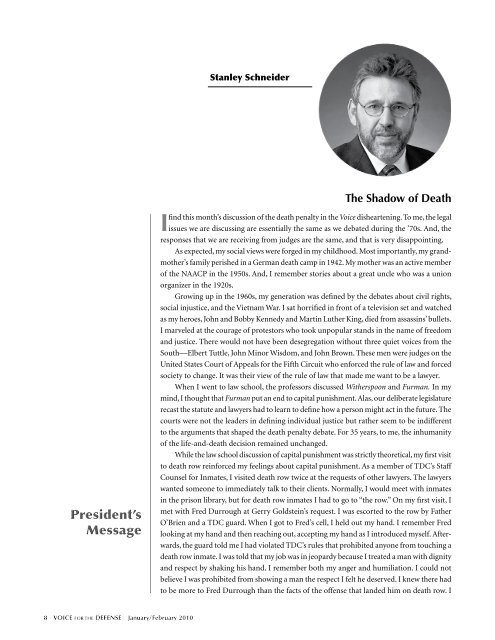for the defense for the defense - Voice For The Defense Online
for the defense for the defense - Voice For The Defense Online
for the defense for the defense - Voice For The Defense Online
You also want an ePaper? Increase the reach of your titles
YUMPU automatically turns print PDFs into web optimized ePapers that Google loves.
Stanley Schneider<br />
President’s<br />
Message<br />
<strong>The</strong> Shadow of Death<br />
I<br />
find this month’s discussion of <strong>the</strong> death penalty in <strong>the</strong> <strong>Voice</strong> disheartening. To me, <strong>the</strong> legal<br />
issues we are discussing are essentially <strong>the</strong> same as we debated during <strong>the</strong> ’70s. And, <strong>the</strong><br />
responses that we are receiving from judges are <strong>the</strong> same, and that is very disappointing.<br />
As expected, my social views were <strong>for</strong>ged in my childhood. Most importantly, my grandmo<strong>the</strong>r’s<br />
family perished in a German death camp in 1942. My mo<strong>the</strong>r was an active member<br />
of <strong>the</strong> NAACP in <strong>the</strong> 1950s. And, I remember stories about a great uncle who was a union<br />
or ganizer in <strong>the</strong> 1920s.<br />
Growing up in <strong>the</strong> 1960s, my generation was defined by <strong>the</strong> debates about civil rights,<br />
social injustice, and <strong>the</strong> Vietnam War. I sat horrified in front of a television set and watched<br />
as my heroes, John and Bobby Kennedy and Martin Lu<strong>the</strong>r King, died from assassins’ bullets.<br />
I marveled at <strong>the</strong> courage of protestors who took unpopular stands in <strong>the</strong> name of freedom<br />
and justice. <strong>The</strong>re would not have been desegregation without three quiet voices from <strong>the</strong><br />
South—Elbert Tuttle, John Minor Wisdom, and John Brown. <strong>The</strong>se men were judges on <strong>the</strong><br />
United States Court of Appeals <strong>for</strong> <strong>the</strong> Fifth Circuit who en<strong>for</strong>ced <strong>the</strong> rule of law and <strong>for</strong>ced<br />
society to change. It was <strong>the</strong>ir view of <strong>the</strong> rule of law that made me want to be a lawyer.<br />
When I went to law school, <strong>the</strong> professors discussed Wi<strong>the</strong>rspoon and Furman. In my<br />
mind, I thought that Furman put an end to capital punishment. Alas, our deliberate legislature<br />
re cast <strong>the</strong> statute and lawyers had to learn to define how a person might act in <strong>the</strong> future. <strong>The</strong><br />
courts were not <strong>the</strong> leaders in defining individual justice but ra<strong>the</strong>r seem to be indifferent<br />
to <strong>the</strong> arguments that shaped <strong>the</strong> death penalty debate. <strong>For</strong> 35 years, to me, <strong>the</strong> inhumanity<br />
of <strong>the</strong> life-and-death decision remained unchanged.<br />
While <strong>the</strong> law school discussion of capital punishment was strictly <strong>the</strong>oretical, my first visit<br />
to death row rein<strong>for</strong>ced my feelings about capital punishment. As a member of TDC’s Staff<br />
Counsel <strong>for</strong> Inmates, I visited death row twice at <strong>the</strong> requests of o<strong>the</strong>r lawyers. <strong>The</strong> law yers<br />
wanted someone to immediately talk to <strong>the</strong>ir clients. Normally, I would meet with in mates<br />
in <strong>the</strong> prison library, but <strong>for</strong> death row inmates I had to go to “<strong>the</strong> row.” On my first visit, I<br />
met with Fred Durrough at Gerry Goldstein’s request. I was escorted to <strong>the</strong> row by Fa <strong>the</strong>r<br />
O’Brien and a TDC guard. When I got to Fred’s cell, I held out my hand. I remember Fred<br />
looking at my hand and <strong>the</strong>n reaching out, accepting my hand as I introduced myself. Af terwards,<br />
<strong>the</strong> guard told me I had violated TDC’s rules that prohibited anyone from touching a<br />
death row inmate. I was told that my job was in jeopardy because I treated a man with dig nity<br />
and respect by shaking his hand. I remember both my anger and humiliation. I could not<br />
believe I was prohibited from showing a man <strong>the</strong> respect I felt he deserved. I knew <strong>the</strong>re had<br />
to be more to Fred Durrough than <strong>the</strong> facts of <strong>the</strong> of fense that landed him on death row. I

















